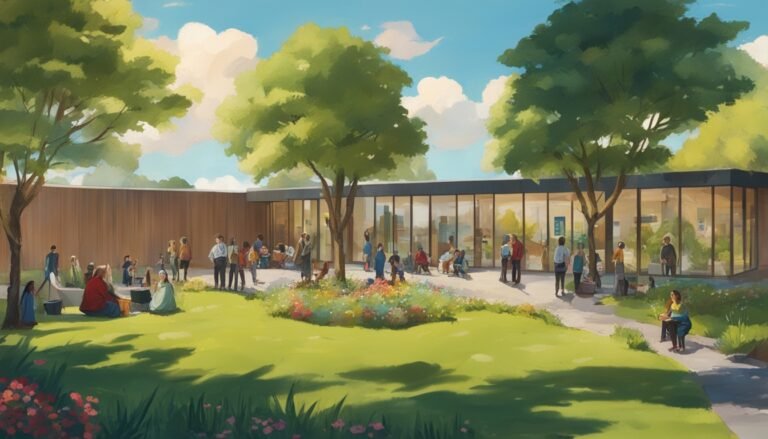Innovative Mental Health Initiatives Transforming the Irish Landscape
Imagine a busy hall in Dublin, buzzing with hope and ambition. In the midst of it all, a young man had fought a secret war with depression for years. He found it hard to seek help due to the judgment and prejudice he encountered. But, a seminar from St Patrick’s Mental Health Services (SPMHS) about their recovery-focused approach opened his eyes to a new beginning.
His story echoes others’ experiences in Ireland. Here, people with mental health challenges often lack full legal and policy support. However, over the last five years, important projects led by groups like SPMHS have changed things for the better. Through a focus on human rights and by building places like The Jonathan Swift Campus, they are leading the charge in making Ireland a better place for mental health support. Their commitment to top-notch, diverse care is redefining what mental health services in Dublin should look like.
The World Health Organization says sound mental health helps folks be their best and give back to their towns. This is just what projects like MyMind’s community spots and SPMHS’s unique programs stand for. They show a step toward meeting high quality rules the Mental Health Commission sets.
Key Takeaways
- Transformative mental health projects in Ireland are leading to significant improvements.
- St Patrick’s Mental Health Services (SPMHS) is vital in advancing mental health in Ireland.
- The World Health Organization emphasizes the importance of good mental health for productivity and community contribution.
- Stigma and discrimination against mental health issues remain a challenge in the country.
- Innovative initiatives like The Jonathan Swift Campus and MyMind’s community hubs offer new solutions.
Introduction to Mental Health Innovations in Ireland
Ireland is making big moves in mental health care, paving new paths with fresh strategies. The voluntary and community sectors are key players. They bring creativity and a strong desire to make mental health care better.
The Role of Voluntary and Community Sectors
Voluntary groups and community organizations are vital for mental health programs in Ireland. A 2023 survey found that 85% of adults believe talking about mental health is crucial. To support this, there’s been a big effort to keep the community informed. An example is the ‘making the connections’ campaign from 2022.
One success is that over 13,000 people finished an online CBT program since April 2023. This shows the success of working with local doctors to refer people. Almost half of those with serious depression are feeling better, thanks to these community-backed programs.
Embracing Change and New Technologies
Ireland’s mental health care is evolving by using new tech. The Health Service Executive’s online CBT program won an award in digital innovation for the public sector. This shows the push to make tech a part of mental health support.
Online therapy programs help a lot of people, especially women and young adults. These efforts in innovation also help in schools. Since 2020, over €20 million has gone into mental health support for students.
There will be more than 25 Healthy Campus Case Studies to share best practices. The University of Limerick and Atlantic Technological University are also hosting the 2025 Health Promoting Campuses Conference. This event will underline health-focused education.
The work of voluntary groups, local communities, and new tech is shaping a better future for mental health care in Ireland. They’re showing the way for ongoing mental health improvements.
The National Mental Health Innovation Showcase
The National Mental Health Innovation Showcase took place on Tuesday, 21st of May. It was from 9am to 1:30pm in Dogpatch Labs, Dublin. This event highlighted innovative mental health projects in Ireland. It showed how the country is improving its mental health resources and increasing awareness about mental health.
Guests at the showcase got to meet with experts, see the latest technologies, and learn about new ways to support mental health.
Key Highlights and Insights
One main theme was reaching people who often don’t get enough mental health support. Dr. Ronan Glynn presented over 50 scientific papers. He shared research and solutions to mental health issues. The event stressed the importance of working together. It showed how teamwork can lead to better mental health care.
The Irish research community has done a lot of great work under Horizon Europe. By 31 May 2023, they had used €395.3 million for mental health research. This shows the positive direction of mental health resources in Ireland. The North-South Research Programme has been particularly successful. It funded 62 projects in 2022, worth over €37 million. The Co-Centre Programme, which started in November 2022 and has a budget of €74 million, also supports innovation.
Speakers and Contributors
The event’s speakers included Dr. Ruth Melia, who works with Stanford University as a Fulbright HRB HealthImpact scholar. She talked about the importance of global mental health research. Another speaker was Elaine Birkett, who has more than 20 years of experience in the Irish Health Service. Ivan Cooper, who holds an MBA from Smurfit Business School, also shared valuable insights.
The Department of Further and Higher Education, Research, Innovation, and Science made a big contribution. It put 52% of the government’s R&D funding in 2021 to good use. It got €0.5 billion for mental health research and initiatives. This shows the government’s strong support for mental health care in Ireland.
The showcase highlighted ways to attract top doctoral students. Through the Innovate for Ireland program, launched in July 2022, the government works with the private sector. The National Challenge Fund, created in August 2022 with €65 million, supports challenges in Green Transition and Digital Transformation. These efforts are making a real difference. They promise a better future for mental health in Ireland.
Digital Mental Health: A New Era of Care
The world is entering a new phase of mental health care with the rise of digital solutions. Now, more than ever, the need for effective and easy-to-reach mental health support is clear. This has become even more important during the COVID-19 crisis.
The Impact of the COVID-19 Pandemic
The COVID-19 pandemic has pushed us further into the digital realm of mental health care. Anxiety and depression increased by 25% worldwide during this time. In Ireland, about half of older adults started using telehealth to meet with their doctors, showing a big shift to digital care.
Online health check-ups have several advantages. They save travel time and costs. They also let doctors monitor your health continuously, which can help catch health issues early and prevent trips to the emergency room.
Strategic Approach Under Sharing the Vision Policy
The strategy of Sharing the Vision is leading Ireland’s mental health care into a new, digital age. It focuses on making care more accessible and effective. The aim is to help users take more control over their mental health.
Many digital health tools are in use now. All health centers have switched to electronic records. And sixty-three percent of health professionals use mobile health apps. Economists say these digital changes are good for our well-being and work efficiency.
One aim is to get more people, especially older adults, using telehealth for staying healthy and preventing diseases. But there are challenges, like making sure everyone has access to the internet, can use digital tools, and keeps their data safe. Overcoming these hurdles is crucial for growing digital mental health services.
Digital mental health is changing the way we help people, making care more personal and accessible. It’s all about using new ideas to meet the many different needs of our communities.
Community-Based Mental Health Services
In Ireland, community-based mental health services are changing to a care system that focuses on the user. They are teaming up with primary health care to provide better help. This makes sure anyone who needs help gets it smoothly and in a straight forward way.
Integration with Primary Care and Other Services
Community-based mental health services are starting to work more with primary health care providers. This way, patients can easily see a variety of health care professionals. These efforts make sure people get complete care that’s well-coordinated.
St Patrick’s Mental Health Services (SPMHS) in Ireland is a great example. SPMHS is the biggest independent mental health service provider in the country. They offer cases in many special areas, like adult psychiatry and psychiatry for the elderly. By doing this, SPMHS can give more efficient help by coordinating several services.
Recent stats show that 68% of Dublin 8 residents felt the pandemic affected their health negatively. This data highlights the need for better connections between mental and primary health care.
Role of Community Mental Health Teams (CMHTs)
Community Mental Health Teams (CMHTs) play a key role in providing well-rounded care. They have professionals from different areas come together. This approach is crucial for helping Dublin 8 residents who have needed mental health support but haven’t gotten it yet.
In places like Dublin 8, where about 31% of residents have long-term health issues, CMHTs are even more important. They make getting mental health support easier, improving the health of the whole community.
Mobile Mental Health Units: Bringing Care to Rural Areas
Mobile mental health units are now serving rural Ireland’s deep need for mental health care. They carry help directly to distant and often forgotten communities. These services are fighting the isolation rural areas often face due to their location.
This effort matches the goals of the Rural Development Policy 2021-2025. It focuses on making life in the countryside better. Studies show that people in rural areas face more struggles to get mental health care, often needing hospital care more often.
The National Broadband Plan is also a big part of this push. It helps by making remote jobs more possible. This helps mobile mental health units work better and serve more people in rural communities. The goal is to make rural areas more self-sufficient by creating local jobs and boosting the overall community well-being.
Several studies have pointed out how hard it is for people in rural places to get healthcare. With mobile mental health units, this situation gets better. Now, experts can quickly reach and help anyone, tailoring their support to fit the specific needs of each area.
These units are also crucial in fighting the stigma around mental health and teaching rural folks about it, too. Their close work with local doctors and specialists creates a complete support system. This approach strengthens rural areas and helps keep mental health on track for the long haul.
To wrap up, mobile mental health units are changing the game in rural Ireland. They are key in making mental health care available to all, no matter where they live. This smart way of delivering care is a big step towards a more equal, healthier rural community.
Peer Support Programs: Aiding Recovery through Community
Peer support programs show that being part of a community support model can greatly help in mental health users’ recovery. They create places where people who have gone through similar struggles can support one another. This kind of understanding and backing is very empowering.
Examples of Peer Support Initiatives
The BRIO program is a great example, made by the SAOL Project in 2015. It helps women who have faced addiction and other challenges. Since its start, 116 women have joined. They come from places such as addiction centers and the justice system. After their training is done, many of these women choose to help their peers. This proves how important peer support can be in maintaining a healthy recovery.
In the UK, a study found that people in recovery tend to volunteer more than others. They engage in community service twice as much. This shows how peer support can guide individuals towards active involvement. It helps in their recovery journey.
Impact on Service Users’ Recovery
Peer support programs have a major positive effect on those trying to recover. Many pieces of research have shown that these programs make it easier for people to seek help and offer vital support after treatment.
For example, research has shown that women who get peer support, like in the BRIO program, go back to jail less often. The work of these voluntary peer supporters is key to this success. They make those recovering feel like they belong and have a purpose in society.
Studies also suggest that community support models help close the gap in mental health care. Policies supporting young people in countries like Australia, UK, Canada, and Ireland are improving. By using what they learn in treatment and building on that, these programs are helping people heal for the long run.
The Role of St. Patrick’s Mental Health Services
St. Patrick’s Mental Health Services (SPMHS) is the biggest independent, not-for-profit mental health service in Ireland. They’re dedicated to introducing innovation in mental healthcare. They run three centers for inpatient care and provide Homecare. SPMHS also offers day programs and services through the Dean Clinic. This ensures people have a lot of support for their mental health.
Vision and Mission
St. Patrick’s Mental Health Services wants everyone to live mentally healthy. Their plan from 2023 to 2027 is all about making good mental healthcare easy to get and about talking more about mental health problems. This plan is focused on making services better, teaching people, doing research, and training people. It also means making sure that the people using their services are part of making decisions about their own mental health care.
Human Rights-Based Approach
St. Patrick’s Mental Health Services believes in human rights in mental health. They respect and meet the needs of each person who comes to them. Even with issues like long waits, stigma, and finding and keeping staff, they aim to offer care that’s all about the person. They keep their care up to quality standards by updating their facilities and offering new ways of care. SPMHS is known for its ethical and human rights-focused mental healthcare.
Collaborations and Partnerships in Mental Health Innovations
Collaborations and partnerships are key to moving mental health innovations forward. They work on local and global levels to swap information and boost mental health projects’ outcomes.
International Collaborations
Working together globally helps tackle mental health challenges from many angles. Many suppliers from around the world join forces through the Digital Health Technology Partner Program. This initiative includes partners from North America, Europe, Asia-Pacific, and Latin America. Healthcare groups, for example, join hands with companies like Nova Networks in Canada to provide top-notch IT solutions since 1993.
These global partnerships rely on models like EMRAM and DIAM to improve digital health care. Moreover, joint research reflects that while some global efforts might not hugely change health results, they still better certain health aspects. For example, when researchers looked at making environments healthier, two of three projects showed health improvements.
National Partnerships
At home, partnerships in countries like Canada and the UK are also vital for mental health progress. The Youth Wellness Hubs Ontario (YWHO) network is a great example of strong national teamwork. It has 22 networks supporting youth hubs in 31 locations in Ontario. These hubs are built by working closely with youth, families, and service providers.
The YWHO virtual hub, designed with young people and families across the province, offers 24/7 support. It lets youth easily set up appointments when they need and fits their schedules. This effort shows the value of dependable national partnerships in providing personalized and effective solutions.
International and national mental health partnerships are crucial for driving mental health innovations. They create a powerful network that helps people worldwide.
Lived Experience Practitioners: Bridging the Gap
Using lived experience in mental health care is a game-changer. It makes services more effective and full of empathy. These practitioners connect people who need help with those who give it, making everyone feel understood. They offer fresh ideas, making mental health care both smart and kind, focusing on what patients truly need.
The Impact of Personal Experience on Service Delivery
Adding personal stories to mental health care makes a big difference. It makes care real and easier to relate to. Practitioners who’ve been through it themselves share insights that make treatments better suited to those they help. This can be seen in aiding kids during the pandemic.
They make treatment less scary, fight against misunderstandings, and help create supportive communities. This way, mental health care becomes a place for everyone.
Examples from Ciara Glynn’s Work
Ciara Glynn is a leader in this approach. Her work has made mental health services better and more open. By telling her own story and pushing for caring methods, she’s influenced a lot of people. Now, mental health care is more about people helping people.
FAQ
What are some transformative mental health projects currently happening in Ireland?
How are voluntary and community sectors contributing to mental health innovation in Ireland?
What technological changes are improving mental health programs in Ireland?
What is the National Mental Health Innovation Showcase?
Who are the key speakers at the National Mental Health Innovation Showcase?
How did the COVID-19 pandemic impact mental health care in Ireland?
What is the ‘Sharing the Vision’ policy?
How are community-based mental health services integrated with primary care in Ireland?
What role do Community Mental Health Teams (CMHTs) play in Ireland?
How do mobile mental health units improve accessibility in rural areas of Ireland?
Can you provide examples of peer support programs in Ireland?
How do peer support programs impact service users’ recovery?
What is St. Patrick’s Mental Health Services’ vision and mission?
How does St. Patrick’s Mental Health Services uphold human rights in mental health care?
What role do collaborations and partnerships play in mental health innovation?
Can you give examples of international mental health collaborations?
How do lived experience practitioners impact service delivery in mental health care?
What contributions has Ciara Glynn made to mental health care in Ireland?
Source Links
- See "Changing Minds. Changing Lives.", our 2018-2022 strategy
- Heart of the Community Fund – The Ireland Funds, Progress through Philanthropy
- Navigating the Dynamic Nexus of Mental Health and Technology
- Navigating The Future: HSE Ireland’s Digital Mental Health Initiatives | EMHIC
- A Whole of Institution Approach to Health and Wellbeing | Higher Education Authority
- Mental Health – A Vision for Change
- Inclusive Innovation – Mental Health Reform
- Impact 2030: Ireland’s Research and Innovation Strategy
- e-mental health innovation and transnational implementation platform North West Europe (eMEN)
- Digital Transformation in Healthcare: Technology Acceptance and Its Applications
- A human-centred vision for improving the mental health care ecosystem | Deloitte
- Smart D8 initiative launches with call for mental health projects
- Opening up while locking down: how an Irish independent sector mental health service is responding to the COVID-19 crisis
- A qualitative study of rural healthcare providers’ views of social, cultural, and programmatic barriers to healthcare access
- Frontiers | Community-based programs for youth with mental health conditions: a scoping review and practical implications
- Part 1: introducing recovery, peer support and lived experience initiatives
- See our strategy for 2023 to 2027
- A Smarter Dublin 8 | News
- Collaboration between local health and local government agencies for health improvement
- Digital Health Transformation – DHTPP
- ICIC24 Conference Programme – Session 11.D Innovative digital care partners
- Fortifying the Foundations: A Comprehensive Approach to Enhancing Mental Health Support in Educational Policies Amidst Crises








